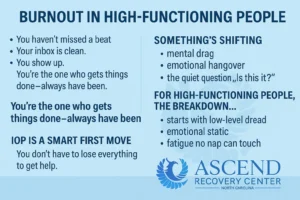You haven’t missed a beat. Your inbox is clean. You show up. You smile. You’re the one who gets things done—always have been.
But deep down, something’s shifting. It’s subtle. No one else can see it yet. But you feel it—the mental drag, the emotional hangover, the quiet question: “Is this it?”
For high-functioning professionals, parents, and perfectionists, the breakdown doesn’t come with sirens. It starts with low-level dread. Emotional static. The kind of fatigue that no nap can touch. If you’re getting by—but no longer getting better—that’s the moment to pause.
At Ascend’s Intensive Outpatient Program (IOP) in Charlotte, we help people intervene on that moment before it spirals. You don’t have to hit bottom to get support. You just have to want more than this low-grade survival mode.
“Fine” Isn’t the Goal—It’s the Warning Light
If your car ran like your life—barely, with warning lights blinking—you’d pull over. But when it’s your emotions, your energy, your inner world? You just… keep driving.
High-functioning people often confuse capacity with wellness. Just because you can perform doesn’t mean you’re well. You’ve trained yourself to power through everything—deadlines, hangovers, emotional slumps. You’re used to functioning with one tire off the rim.
But the real risk? You start to believe this is as good as it gets. You lose the ability to imagine feeling clear, rested, grounded. You trade peace for performance—and call it adulthood.
That’s not living. That’s coasting with the emergency brake on.
IOP Isn’t a Last Resort. It’s a Smart First Move.
You don’t need to lose your job, get a DUI, or destroy your marriage to qualify for IOP. In fact, we’d rather you don’t wait that long.
Our IOP in Charlotte is built specifically for people who are “doing okay” on the surface, but privately feel like something’s wrong. Maybe you’re using alcohol or substances to manage stress. Maybe you’re just emotionally exhausted and can’t reset. Maybe the version of you people see is starting to feel like a costume.
IOP is how you hit pause without blowing up your life. It’s three days a week—structured therapy, group support, and one-on-one care. You stay in your home. You keep your job. But you stop doing this alone.

The Mask Is Heavy. IOP Lets You Breathe Without It.
One of the hardest things for high-functioning people to admit is that they’re struggling. Why? Because they’ve built their identity around holding it together.
But here’s the truth: the people who need support the most are often the best at hiding it.
In IOP, you get to take off the mask. You don’t have to pretend you’re fine. You don’t have to explain why you’re not in crisis. We already know what it feels like to be the helper, the overachiever, the one everyone leans on.
Our program is full of people who look like they have it all together—and were quietly drowning. The freedom of being honest, unedited, and fully human is a powerful first step toward actual healing.
Numbness Isn’t a Strategy
You’ve probably told yourself some version of this:
“I’m not addicted. I’m just tired.”
“I’m not depressed. I’m just stretched thin.”
“I’m not spiraling. I’m just stressed.”
But when the stress becomes constant, the numbness becomes necessary. Maybe it’s wine every night. Maybe it’s weed all weekend. Maybe it’s overworking, over-planning, over-anything just to avoid sitting still.
At some point, coping becomes the problem—not the solution.
IOP helps you get underneath that autopilot. It’s not just about stopping behaviors. It’s about understanding what’s fueling them—and building a life that doesn’t require sedation just to tolerate.
You Don’t Have to Lose Everything to Get Help
We hear it all the time:
“I’m not bad enough to need a program.”
“I still show up to work.”
“I still take care of my kids.”
Great. That’s exactly why IOP works. Because you haven’t lost everything. And you don’t have to.
The earlier you get support, the more you get to keep—your career, your connections, your clarity. Our IOP in Charlotte isn’t about tearing your life apart. It’s about giving you the space and skills to rebuild from the inside out—while staying in your real world.
What IOP Actually Looks Like for High-Functioning People
We know your schedule’s full. We know your time matters. That’s why IOP is designed to fit your life, not overtake it.
Here’s what to expect:
- Three sessions a week, often in the evenings
- Group therapy with others who understand high-functioning pressure
- Individual sessions for personal clarity and strategy
- Skills training to manage stress, cravings, relationships, and burnout
- Confidential, stigma-free care—no judgment, no labels
It’s not a bootcamp. It’s not a breakroom. It’s structured, strategic, and rooted in evidence-based care.
FAQs: IOP for the High-Functioning
Do I have to call myself an addict to go to IOP?
No. We’re not in the business of labeling you. If you’re using substances, stress, or busyness to avoid reality—and it’s not working anymore—IOP might be a fit. That’s all you need to know.
Will this disrupt my job or family life?
No. That’s the point of outpatient care. You stay in your environment while accessing structured support. Sessions are typically in the evening to minimize disruption.
What if I’m not sure it’s “bad enough”?
If you’re asking that question, it probably is. IOP isn’t a punishment—it’s a proactive move. You don’t need to hit bottom to want better.
Is this confidential?
Absolutely. Your participation is protected, and we take confidentiality seriously. Many of our clients are professionals, parents, and public-facing individuals.
How do I know if IOP is right for me?
If you feel emotionally flat, secretly overwhelmed, or unsure how long you can keep up the pace—IOP can help. It’s a middle path: serious support without total disruption.
You’re Allowed to Want Peace Without Losing Your Edge
Somewhere along the way, we sold high-functioning people a lie: if you’re successful, you should be happy. If you’re productive, you must be well.
But burnout wears good clothes. Addiction hides behind titles. Emotional exhaustion can live in a smiling photo.
Choosing help isn’t admitting defeat. It’s choosing to stop making survival your default setting.
You don’t have to implode. You don’t have to wait. You’re allowed to get support now—before anything breaks.
Let’s Talk Before the Mask Cracks
Call (866) 606-5732 or visit Ascend’s IOP program in Charlotte to see what life could look like with support. Quiet, real change is possible. You don’t have to fall apart to earn it.


